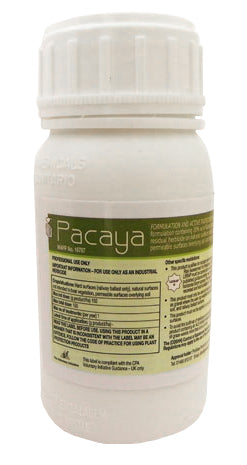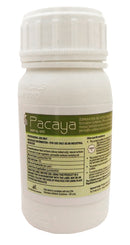Description
| Product Overview | |
|---|---|
| Product Type | Herbicide |
| Product Name | Pacaya |
| MAPP No. | 16797 |
| Active Substances | Flazasulfuron |
| Formulation | Water dispersible granule |
| Areas of Use | Natural surfaces not intended to bear vegetation, permeable surfaces overlying soil, hard surfaces (railway ballast only), amenity vegetation (around) |
| Amateur/Professional | Professional |
| Phytomobility | Residual |
| Mode of Action Group | Inhibition of ALS |
Pacaya Flazasulfuron 50g - Mapp No. 16797
Active ingredients: 25% w/w flazasulfuron.
Pacaya is a long-lasting residual herbicide which remains active on surfaces it is applied to for up to 5 months. Pacaya can be applied to a number of non-crop surfaces as well as around amenity vegetation preventing the emergence of susceptible broad-leaved and grass weed species.
Pacaya has a limited effect on very young weeds but in general should be tank mixed with glyphosate for effective post-emergence as well as the long-lasting residual activity of Pacaya.
For best results the surface should be left undisturbed after application to ensure that the barrier effect created by Pacaya remains active.
This 50 g bottle is sufficient to treat 3333 m2 for up to 5 months.
Target Species
Pacaya gives pre-emergence control by forming a surface barrier that prevents germination of a wide range of broad-leaved and grass weeds.
*A limited number of weed species are not effectively controlled by Pacaya (see label for further details).
Instructions for use
Where to use
For use on:
- Natural surfaces not intended to bear vegetation - Areas of soil or natural outcroppings of rock that are not intended to bear vegetation
- Permeable surfaces overlying soil - Any man-made permeable surface (excluding railway ballast) that overlies soil and is not intended to bear vegetation
- Hard surfaces (railway ballast only) - Any railway ballast impermeable surface that is not intended to bear vegetation
- Amenity vegetation (around) - Any areas of semi natural or ornamental vegetation, including trees (see product label for susceptible non-target plants)
When to use
Pacaya is most effective when it is applied in the early to late spring before weeds the have germinated.
| Application Window | |||||||||||
|---|---|---|---|---|---|---|---|---|---|---|---|
| Jan | Feb | Mar | Apr | May | Jun | Jul | Aug | Sep | Oct | Nov | Dec |
How to use
| Maximum Treatments | Pack Coverage | Application Method | Application Rates | Water Volume | Spray Quality |
|---|---|---|---|---|---|
| 1 per annum | 3333 m2 | Conventional knapsack sprayer Vehicle mounted sprayer |
150 g/ha | 200-600 l/ha | Medium |
- Add half the required water to the spray tank
- Add the required amount of Pacaya to the spray tank and agitate thoroughly
- Top-up the spray tank with water to the required level
- Use immediately
- For maximum persistence do not cultivate or rake the area following application
- Clean application equipment with a diluted ammonia solution following use
Additional Information
- A Local Environment Risk Assessment for Pesticides (LERAP) must be carried out in accordance with CRD’s published guidance before each spraying operation from a horizontal boom sprayer.
- Can only be used on natural or porous surfaces such as gravel where the user can establish that the underlying surface is soil, and railway ballast surfaces.
- Must not be applied to any non-porous man made surfaces.
- Avoid spray drift onto non-target plants.
- When treating around amenity vegetation do no apply near species that have been planted for less than 2 years.
- Do not allow direct spray to fall with 5 m (horizontal boom and train sprayers) or 1 m (hand held sprayers) of the top of the bank of any static or flowing water body.
Active Substances
Flazasulfuron
Bio-Chemical Mode of Action: Flazasulfuron belongs to the inhibition of Acetolactate Synthase (ALS) group of herbicides.
Acetolactate synthase is an important enzyme involved in the biosynthesis of branched-chain amino acids. ALS inhibitors interrupt this process causing the plant to initially become chlorotic before necrosis of plant tissues followed by whole plant death occurs.
Mobility: Flazasulfuron is a systemic penetrant which means that the active substance can be translocated downwards through the plant within the phloem (sugar conducting tissues) and upwards through the plant within the xylem (water conducting tissues).
Application timing: Residual ALS inhibitors are best applied prior to the emergence of weed species.
Resistance: ALS inhibitor herbicides pose a high-risk of resistance particularly for grass weed species including black-grass, Italian rye-grass and wild oats. To reduce the risk of resistance follow label instructions and rotate use with herbicides with differing modes of action.
Safe Use of Pesticides
The purchaser and/or end users are responsible for ensuring that these products are used in line with industry Approved Codes of Practice. All operators must be trained and certificated in using and applying any Ministry Approved professional product.
Please be aware that by proceeding you are purchasing a professional pesticide product.
You must ensure the end user of these products complies with the DEFRA/HSE Code for the Safe use of Pesticides:
"By law, everyone who uses pesticides professionally must have received adequate training in using pesticides safely and be skilled in the job they are carrying out."
For further information regarding Pacaya Flazasulfuron 50g, please contact our technical sales team on 01902 440280.
Technical Information
Safety Data Sheet
SKU - 188718
Product Label
SKU - 188718
Delivery and Returns
Delivery charge (if applicable) applied at checkout. Next working day delivery is available on some products, as an option on orders placed before 1pm - excludes festive season & bank holidays. Please note deliveries to Highlands, Cornwall and more remote areas may take longer. Surcharges apply for non mainland locations, call for more information - More delivery information.
We require deliveries to be signed for. If no one is available to sign for your delivery, you may request it is left in a safe place by leaving a signed note for the driver, requesting the item is left without a signature. Please note that this is left at your own risk and at the driver's discretion.
For large orders, please be aware that if you require a smaller 7.5 tonne lorry, the maximum weight for pallets is 750 kg - otherwise the standard pallet size limit of 1000 kg applies.
Please note for deliveries that require a pallet, the pallet/packaging itself is the customer's responsibility and will not be uplifted or taken upon delivery.
If you have any access restrictions for lorries or large vehicles please speak to our sales team on +44 (0)1902 440250.
Collection from our Telford, Shropshire, Trade Counter is available for this product - More collections information.
Safe use of pesticides
The purchaser and/or end users are responsible for ensuring that these products are used in line with industry Approved Codes of Practice. All operators must be trained and certificated in using and applying any Ministry Approved professional product.
Please be aware that by proceeding you are purchasing a professional pesticide product.
You must ensure the end user of these products complies with the DEFRA/HSE Code for the Safe use of Pesticides:
"By law, everyone who uses pesticides professionally must have received adequate training in using pesticides safely and be skilled in the job they are carrying out."






